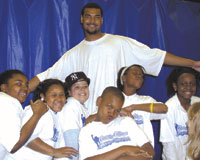NCAA News Archive - 2006
« back to 2006 | Back to NCAA News Archive Index
Connecticut College program shows that kids, book and athletics go together
|
The NCAA News
Connecticut College is a small liberal arts institution in New London, Connecticut. Though fewer than 2,000 students call the 750-acre campus their educational home, the college is making a huge impact in the surrounding community with an innovative program that teaches youth that reading and fitness are fundamental.
The college launched Project KBA (Kids, Books and Athletics) five years ago to improve the physical fitness level and literacy skills of youth in the community.
"Studies indicate that if children learn to read by third grade, their success in academics will be much higher," said Tracee Reiser, program creator and associate dean of community learning at the college. "And regarding fitness, obesity is an extremely pressing issue in our community and nation. Having examined those two critical needs in our community, we created a program that would address both."
Project KBA is a collaborative effort among the college’s athletics department, the school’s Office of Volunteers for Community Service and the Holleran Center for Community Action and Public Policy. The initiative calls for teams of Connecticut College students to travel to designated sites each week to engage children in 20 to 30 minutes of structured exercise, followed by small-group reading and discussion sessions.
Most Project KBA sites are after-school programs that cater to elementary-school-age children, though the program recently has expanded to two preschools. Both the exercises and reading material are chosen based on research and are age appropriate. Books also must echo multicultural themes and sometimes may be in Spanish.
Last year, more than 400 children participated in Project KBA, and since it began in 2001, the program’s corps of volunteers has grown to include more than 100 college students and staff. Rebecca McCue, interimdirector of the Office for Volunteers for Community Service, said most of the volunteers are student-athletes. But because Project KBA also has been integrated into academic courses in disciplines such as physical education, human development and public policy, the initiative also draws volunteers like Nick Vealitzek.
A 2004 graduate of the school and a former student-athlete, Vealitzek initially became involved with Project KBA through an education course he took as an undergraduate. Now an assistant men’s ice hockey coach at the college, he has remained involved because he believes in the program’s mission.
"With the state of a lot of schools finding ways to cut costs, one of the casualties is physical education. So programs like this are invaluable in teaching kids the importance of staying fit and active," he said.
As a coordinator of a team of volunteers, Vealitzek said he tries to be more hands off, though one of the most rewarding things about the experience is watching the relationships develop between students and participants.
"That for me is very rewarding to see, for the student-athletes to realize their role as teachers and mentors, and for the kids to react to the attention and embrace the idea of this hour-long event," he said.
Planned field trips to the Connecticut College campus and designated family nights enhance Project KBA’s uniqueness. Once a semester, organizers arrange a tour of the campus as a way of encouraging students to begin to envisioning continuing their education, said Reiser.
Project KBA family nights were introduced last year. Organized by special request of a few sites, the events followed the same model as weekly sessions with student volunteers leading parents, grandparents and siblings through structured exercise and reading. This year, McCue said the project has secured a grant to ensure each site will sponsor its own evening of family activities.
Though schools and other community-based programs clamor to become part of Project KBA, Reiser said the program is currently at capacity. However, organizers believe it could be applied more broadly to reach more people.
"You have kids who need to read better. You have kids who need to be more physically fit and reduce their obesity. You have college students who love to play, read and engage in athletics. I think it’s a model program that with local variables applied, could work anywhere," she said. "It’s making an impact. Students read better, they are more conscious of what they eat, they drink water. Hopefully, we’re setting patterns and styles that will last a lifetime, including the desire to be engaged in education."
© 2010 The National Collegiate Athletic Association
Terms and Conditions | Privacy Policy

